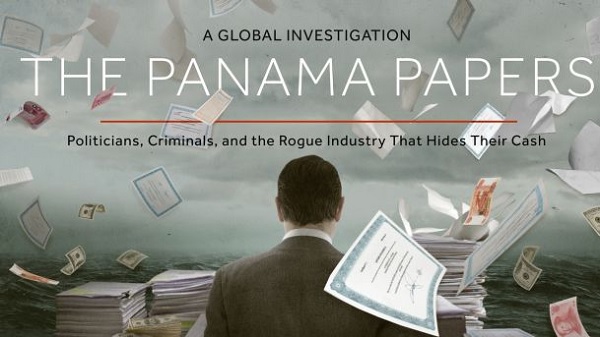By Najma Minhas
One head has rolled and many more are spinning as those in the limelight try to deal with the implications of the Panama Papers leaks. An Alice in Wonderland world has opened before us. Every day we learn more about the crafty world of lawyers and accountants, used by the ultra-rich who siphon their money legitimate or otherwise into shell companies hidden away from the tax authorities of the world.
We mere mortals are finding out about the complexities of this world thanks to the arduous and laudatory work being done by the Munich Newspaper Suddeutsche Zeitung working with the International Consortium of Investigative journalists, who in the short to medium term may have done more for the cause of democracy and accountability of leaders than anyone else.
In the Panama Papers, over 200 people from Pakistan have been named as having offshore companies; this includes media organizations, businessmen, a sitting and a retired judge, and most controversially politicians and their relatives. So far the list includes the three children of the sitting prime minister, Nawaz Sharif; relatives of the two wives of Shahbaz Sharif (the chief minister of Punjab and Nawaz Sharif’s brother).
The name of ex-prime minister Benazir Bhutto name has cropped up as well; she, her nephew Hasan Ali Jaffery and former interior minister Rehman Malik are said to have co-owned Petrofine FZC. The family of Osman Saifullah, a senator for the PPP, holds the record, having registered 34 offshore companies.
Ironically, Osman Saifullah is currently a serving member on the tax reform commission ; though of course these companies may all be legitimate, it’s no wonder people may get the impression that the cat is being asked to take care of the canary.
Pakistan is a poor country. Its GDP in 2015 was $270 billion, and it has a foreign debt over $62bn. It also has a perennial problem collecting taxes. In 2013, its tax-to-GDP ratio stood at 11.2 percent, among the lowest in the world. In order to increase taxes collected, Pakistan has moved disproportionately toward a system of indirect taxes that hits the poor where it hurts them hardest: food, drink, and transport to work. At the same time, Pakistan has received massive amounts of aid in the past 10 years from developed countries. USAID alone gave close to $2 billion in the last three years.
For a poor country like Pakistan, a recipient of foreign aid, two important questions arise from the Panama leaks; what is the original source of this money and was tax paid on it before it left the country to invest in bigger and better things?
The Pakistani prime minister, Nawaz Sharif, gave a recorded speech to the nation where he went on the offensive and claimed the family was being politically maligned over the leaks. He announced that he would set up a judicial commission seen as the graveyard of inquiries to clear the family’s reputation, explaining that the funds were legitimate profits from industrial successes.
Critics, however, question how the family made enough money for Sharif’s children to set up large offshore companies in 1993 and 1994 and buy multi-million flats in London. It should be pointed out that Sharif’s political career was booming at that time; he was the finance minister of Pakistan’s largest province, Punjab, from 1981-85, was Punjab’s chief minister between 1985-90 and then prime minister of Pakistan between 1990-93.
The opposition is refusing the idea of an investigating commission headed by a retired judge. They have said that the commission does not have the qualifications to analyze where the money has come from. Instead, the opposition is demanding a forensic audit of the money through a qualified international company. The problem is far bigger than one family, however. Estimates of amount lost annually to the Pakistani Exchequer because of corruption vary between $50 billion to $75 billion. Last year, people were glued to their TV screens as model Ayyan Ali was tried and convicted of money smuggling after caught with $500,000 cash in her bag as she was taking a flight to Dubai.
Ayyan purportedly made around 42 trips abroad the past few years. She is believed to be one of many carriers of cash. The former state bank governor Anwar Yasin stirred up a hornets’ nest in 2013 when he told a parliamentary committee that up to $25m daily is taken out of Pakistan in briefcases.
Despite their wealth, some of these individuals pay negligible amount of tax. Some of the 200 names linked to offshore companies by the Panama Papers do not even appear in the Federal Board of Revenue’s published lists of Pakistan’s top taxpayers. Many made their wealth in sectors where they for years have lobbied governments for protection and subsidies to run businesses. In the case of politicians, many registered companies were set up during their times in power.
For years, there have been rampant rumors in Islamabad about the interest that respective Pakistani governments have shown in doing business with Turkey and China, countries with lax attitudes toward bribery and money laundering regulations. Furthermore, speculation has abounded that some of the companies that appear in the guise of Chinese or Turkish companies are actually front companies in offshore locations with actual ownership being local political leaders.
The Panama Papers leaked documents from Mossack Fonseca, one law firm in one country. There are probably many more names out there. Pakistan’s problem with tax dodging and corruption is not news, but the scale revealed by the leaks is certainly jarring.
‘Courtesy The Diplomat’.







